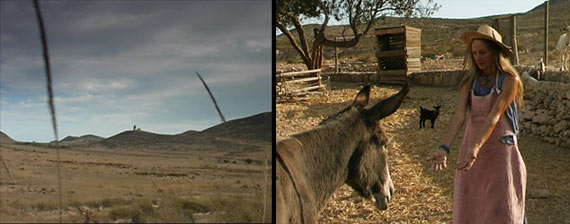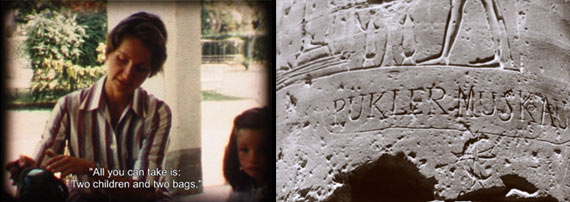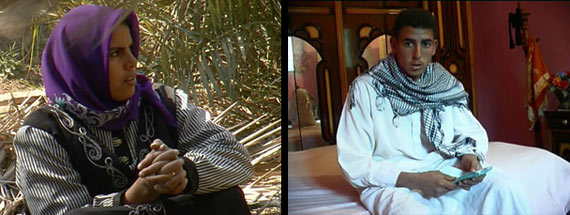|
Commentary As travelers, the protagonist and film author put themselves on the road, in a narrative that starts back 39 years earlier – in Egypt. The story is about a women who is over 70 years old and an art instructor, semiotician and goat herder - Paola Beate von Pueckler. We follow her as she flees together with her two children from Cairo to Germany, to free herself from the constraints of marriage. Now, that so many years have gone by, she returns to the places of her former life. The film relies on the strength of its images. There is no commentary, thoug in dialogue with the film maker, Beate von Pueckler talks about her experiences, perceptions and imaginations. While she reflects on her daily life and past life, she draws a line between the orient and occident. Her memories create the plot of the film, it is her life story that is the "red line" that takes the viewer to Egypt. However, the story of the travel is told through the lens. The images let us dive into a world that is beautiful and foreign. Moments that create a closeness to the figures, rarely seen in documentary movies. It allows an intimate view into a life. A specialty, that distinguishes this „auteur" film. The numerous portraits in the film raise more and more questions about the how and why of this paticular life. Many of the questions, the film leaves unanswered. For example, it remains open, what exactly happened in the years between the life of Beate von Pueckler today and her escape from Egypt. Her life path is shown only as fragments. We meet her the first time in Al Andalus, where she lives today. |
||||||||
 |
|||||||||
|
There
Beate von Pueckler runs a modest goat farm on the Spanish coast of Andalusia.
Unprejudiced the viewer is confronted with her. Little by little, we
find out through her own descriptions the reasons that made her live
a life that is relatively simple compared to contemporary western lifestyle.
A life on a self sustained farm with goats and many other animals in
a deserted astonishingly beautiful landscape. Crucial for her decision
was cancer, that gave Beate a new direction. Convinced about the healing
forces of goat milk, she chose this form of life. She talks about how
she has learned to perceive herself in a new manner, to better understand
herself and her body. She talks about the influence of the landscape
and daily work which has changed her perception of herself and her body.
How she comes to understand to live with cancer. The film opens show what impact the absence a commentary can create. Instead of arbitrarily following the conclusions of a narrator, the images and comments at the beginning of the film bring us together with Beate from the abstraction of a civilized life to a more concrete form of being. In its whole length, the film stays true to this principle that pays off for the spectator. Carefully guided by the camera, from the peaceful Andalusian coast to the busy streets of Cairo we find ourselves in a different world. There we experience in numerous human encounters more about life in a country that from a western perspective seems foreign. Here, the actual travel begins, back to the country in which Paola Beate has lived with her family, confronted with her own painful memories. The motif of traveling however is a double entendre. It is a search for roots. Beate von Pueckler herself remarked about traveling that „the traveller is not only encountering the strangeness in foreign countries , but on the same time ones own otherness.“ For Beate, to confront her own otherness that suddenly comes back from oblivion through the encounter with the unknown. She enters the place of her past life in Cairo. She is surprised that the old issues and demons return which she believed she had overcome. She tells, how she was considered mad to get an education as a wife and mother of two children, how she covered herself in silence on social occasions due to the attacks on her in certain social environments. Finally, we hear about her decision after violent experiences in her marriage to leave with her children the country that she loved so much. Her encounters with her past let her memories emerge from a past that has become foreign to herself. |
|||||||||
 |
|||||||||
The
travel to Egypt emerges as a search, a search for the origins of her
own being. The travel leads Beate von Pueckler to the traces of her
ancestor: Hermann Fuerst von Pueckler Muskau. During his lifetime a
shining figure, he became known as a landscape architect, dandy, world
traveler, adventurer and liberal writer. The literary result of his
orient travels was published in 1844 the documentation of his travels
„Out of Mehemed Alis Empire“, today, a valued reference
of that time. He was drawing a different image of the Orient. Mehemed
Ali was modernizing Egypt after a European model and in the west deviled
as despot. Pueckler was correcting according to his opinion the wrong
interpretations of Mehemed Ali in the German public. His great grand
nice Beate von Pueckler follows his traces and writes down her travel
experiences and allows the viewer to take part in her reflections. Consequently the documentary is not following the logic of a critical reporting about dangerous islamic fundamentalism, even thought the film was shot shortly after september 11. Daily life stands in the foreground, the encounters with the people and their living habits. Scenes of a bazar and the images of the sensuousness life in Cairo at night leave an impression of a country that must evolve in the western traveler. The encounters during a camel trip at the edges of the desert- - or the portrait of a "felach" - - a palm tree peasant farmer - - tells of joy in the life of the people and also their sorrows and needs. Again and again one encounters death, which appears to be something totally ordinary, as life itself. It is the principle of „as well as also..." that becomes apparent once you look closer into the film, which might seem foreign and paradoxical. |
|||||||||
 |
|||||||||
This
documentary film breaks refreshingly with our media stereotypes and
challenges the spectator. It shows another reality, one that is recorded
from a strongly subjective point of view. They tell their own stories.
The images speak, borders are crossed. The language of these images
help to overcome the paralyzed silence of incomprehension. And who knows,
it might be time to revise these images of the orient that are drawn
from the west. Stefan Grill |
|||||||||